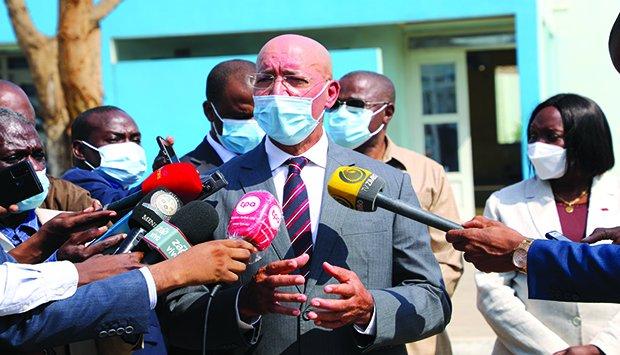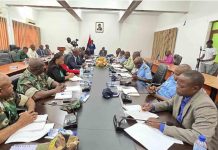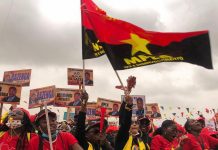Africa-Press – Angola. The Reconciliation Commission in Memory of Victims of Political Conflicts (CIVICOP) announced, this Tuesday (22), the location, in Luanda, of ten bones, which are presumed to be of people involved in the events of May 27.
According to the coordinator of the commission, the Minister of Justice and Human Rights, Francisco Queiroz, the bones could be those of Nito Alves, Pedro Fortunato, Bakalof, Sianouk, Monstro Immortal, Sita Valles, José Van-Dúnem, David Zé, Urbano de Castro, Domingos Barros “Sabata”, Artur Nunes and also Júlio and Ilídio Ramalhate, twin brothers employed by the former DISA
In statements to the press, at the end of the III meeting of the second phase of the Commission, the Minister of Justice and Human Rights believes that they belong to the victims of the 27th of May, because of the way in which the bones were found, taking into account location and indicators.
Francisco Queiroz said that the micro-location and removal sub-group located the bones, which have already been handed over to the medical-forensic team, to carry out DNA tests. “There is still no certainty as to who the bones belong to,” he said, stressing that eight individuals have complete bones and two others only partial.
The minister added that genetic material had already been collected from 35 families. “There’s a good chance that once you’ve looked at the families and the bones, you can come to the conclusion that some of these are, in fact, what we’re thinking of,” he explained. He revealed that the works are advanced and the families have collaborated, in the sense of obtaining the genetic results of DNA and making the crossing with the same type of analysis done on the bones.
This work, he stressed, requires great technical rigor and a lot of patience, therefore, “we are not yet in a position to say that this set of bones belongs to this or that individual”. Francisco Queiroz clarified that the list of names is superior to that of located bones.
For the process of collecting genetic material, the Commission sent letters to families in order to cross-reference with the bones found. As for the cases of families residing abroad, Francisco Queiroz clarified that the principle adopted by the Commission is that the DNA test be carried out in the country. The genetic material of these families is collected abroad, so they do not need to come to the country.
The Commission will move a team to Lisbon (Portugal), where most families are concentrated. The collection will be made at a renowned institute, indicated by the family members themselves. The DNA examination work must be carried out in Angola, because this is where the genetic profiles of the bones under analysis are found and this is where the crossing has to be carried out. The minister said that the possibility of the bones being transferred to the countries where the families are located has also been analysed, and the examinations can be carried out there. But the fact, according to the minister, would have many implications, given that the examination of bones, blood and saliva of the families must be carried out in the same place. “This has ethical, deontological, legal and other very serious implications, so it was concluded that the genetic material must come to Angola and the tests are carried out here”, he said.
On the occasion, the minister assured that the work of the Commission will continue in other locations, with emphasis on the locality of Jamba, where they will work with representatives of UNITA, at CIVICOP, for the collection of bones.
Francisco Queiroz stressed that, in addition to Jamba, he hopes that other locations will be indicated by UNITA for the location of more bones. There is also the case of a foreign citizen, which does not have much to do with the issue of victims, but has been considered and will be dealt with within the Law and Principles and the legal rules for locating and exhuming bodies and transferring them abroad. , outside CIVICOP.
Indemnity
On the compensation argument raised by the 27 de Maio Foundation, the minister said that CIVICOP’s principle is that work should not be remunerated, but that the possibility of providing some logistical support to certain families that have some difficulty in time of the death.
“It will be analyzed on a case-by-case basis and not as an obligation of the Commission”, he clarified, to add: “This is a patriotic attitude that does not have much motivation with making money, and people should have that moral feeling, because it is something that is not pay”.
For More News And Analysis About Angola Follow Africa-Press






